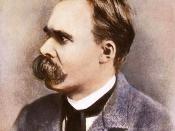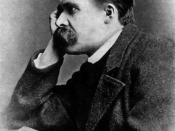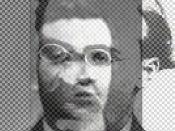The Overman in Thus Spoke Zarathustra
"God is dead!"-So begins Thus Spoke Zarathustra, Nietzsche's fearless-and indeed ferocious-attack on the state of mankind (Nietzsche 12). Undoubtedly inspired by the uproarious reception of Darwin's Origin of Species, Nietzsche set out to dismantle the future as ruthlessly as Darwin had the past. But Nietzsche, ever enticed by the power of paradox, was himself a curious kind of human-wrecking ball: ruthless but not reckless, he knew the success of God, the Church's God, rest on the hope that it offered to the everyman. It is thus by way of hope, a new hope, that we arrive at his most infamous creation: the overman.
But to declare, "God is dead!" is hardly to deny the existence of God: where there is now death, there was once life, even birth. In this respect, Nietzsche seems more dissatisfied than altogether unconvinced by faith. He suggests that God is today an unfit dictator of the moral realm, painfully out of step with the demands of modernity.
It is here that his disdain for religion, and more particularly for the Church as an institution, appears most explicitly. The chapters "Despisers of the Body" and "Preachers of Death" deliver Nietzsche's most compelling (and indeed most explicit) blows to the institutions of faith, of which clergymen must bare the brunt.
Enter the overman: faster than a speeding bullet! More powerful than a locomotive! Able to leap tall buildings in a single bound!1 The overman defies the everyman; he is that enigmatic end to which the everyman is only a means, "a rope, tied between beast and overmanâ¦a dangerous on-the-way, a dangerous looking-back" (14). Having effectively removed God from the philosophical landscape, Nietzsche runs a swift and sweeping rescue operation for the whole of mankind. Ever aware of the gravity...


